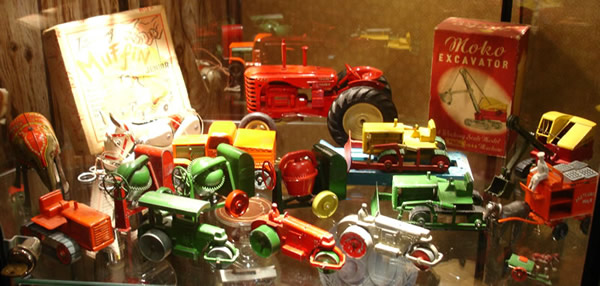Rarities from Charlie Mack's Museum  6/15/06
6/15/06
Lesney toys displayed at Charlie's museum ![]() 6/15/06
6/15/06
The following information was prepared by George, the Virtual Collector [with slight modification] ![]() 6/20/99
6/20/99
Regular Wheels
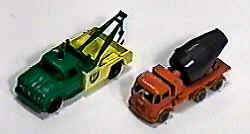
13-D and 26-B
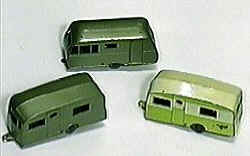
rare metallic green 23-B and 23-C, and a pre-pro (right)
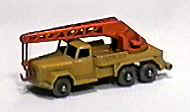
30-B in tan
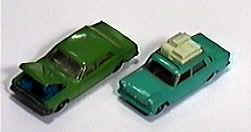
two pre-pros
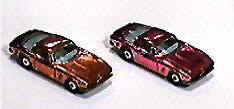
Iso Grifo pre-pros
Superfast
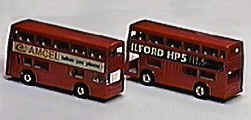
double-decker bus with "CAMCEL Takes You Places" labels (left) and rare limited edition promotional labels of "ILFORD HP5 FILM" (right)
These are not regular wheels, but I [Ethan] am posting it so it does not vanish as George, the Virtual Collector, is ceasing his pages. Information as it appeared on George's pages [with modification], prepared by fellow Matchbox collector Bob Neumann with his own remarkable knowledge of Matchbox and using references from: (1) the "Superfast Range" Chapter (authored by Paul Carr) of McGimpsey-Orr's Collecting Matchbox -- The First 40 Years; (2) U.K. Matchbox Journals; (3) & conversations with Charlie. MB-17 rare limited edition promotional models. Traditional double-decker bus known as "The Londoner" cast in 1:121 scale and based on the Daimler Fleetline D.M.S. supplied to London Transport. The body work on the real vehicle was done by Metro-Cammell and Park Royal. The "CAMCEL Takes You Places" labels used on the model (left) are red and black letters on a white background. It was distributed through the Watford, England distribution branch in 1976. The same bus casting (right) with rare limited edition promotional labels of "ILFORD HP5 FILM" in white letters on a black background, also manufactured and distributed in 1976.
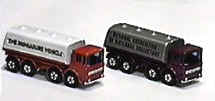
MB-32 Leyland Tankers
In 1972, two specially colored MB-32 Leyland Tankers were produced for a membership promotion for the Adult "Matchbox" club "National Association of Matchbox Collectors (NAMC)". The club was headed up by Bob Brennen and is no longer in existence. This casting of the MB-32 Leyland Tanker was originally sold with black plastic "regular" wheels until the changeover to Superfast wheels which included this model. The Superfast-wheeled Leyland Tanker is most commonly found with Green Cab and White Tank with "BP" labels, and a rare version has a blue cab and white tank with "ARAL" labels produced for the German market. The "NAMC" promotional tankers are by far the hardest to find and were manufactured by Lesney, first with a metallic purple cab and silver tank, and a later production run had a red cab and white tank. The purple and silver tankers were shipped to the NAMC club without labels. At this point the labels on the tank sides were applied by the staff at NAMC and mailed out to NAMC members who satisfied the promotional requirements.
It is believed by the collecting fraternity (source: Charlie Mack) that the red and white tankers were labeled within the Lesney factory. Tankers exist with "N.A.M.C" labels on both sides while other tankers like the model shown include the label "N.A.M.C" on one side and "The Miniature Vehicle" on the other. "The Miniature Vehicle" was another publication by Bob Brennen which covered die-cast vehicle collecting of all brands, not just Matchbox.
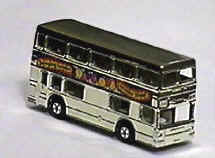
MB-17 "The Londoner" Chrome Plated
Lesney included this model as part of their "Giftware" range in the 1970's. The "Giftware" range is mostly noted for including gold and silver vacuum plated Models of Yesteryear with special mounting holes in the base plates designed to allow them to be screw-fitted as decorations on ashtrays, cigarette boxes, etc. The Superfast "Londoner" Bus was also included in the range for a very short time and is now very hard to find. The bus was available in either chrome or gold vacuum plating with either "Swinging London-Carnaby Street" labels as shown or with "Berger Paints" labels. The baseplate had two large bosses cast that facilitated the use of mounting screws. Some of these base plates have been found on standard issue red painted production models.
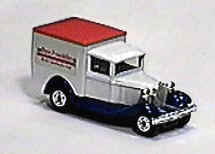
MB-38 Model A Van
One of the rarest MB-38 Model A Van variations, with only 1,000 produced and given away at a 1984 Ben Franklin (U.S. based discount store) convention to store-managers. Managers not attending were sent models in the mail. The label "Ben Franklin-Better Quality for Less" was applied to base "Pepsi Cola" models without "Pepsi" tampo print. Forgeries of this labeled model exist, so be aware of authenticity regarding this piece.

MB-48 Sambron Jacklift
Many variations of the MB-48 Sambron Jacklift exist. The first issue was a special release produced in 1977 for the English Division of the French "Sambron" company and included a tampo-printed "Sambron" logo within a rectangle on the side of the vehicle facing away from the camera in this image. Most were sent to France, but some were found in England. Any version of this model without the "Sambron" tampo on one side is considered common.

Corvette T-top
The Dark Blue Corvette T-top shown with "Superfast" low-friction multi-spoke wheels that are not normally found with this model, found by Charlie Mack in a Bradley's Department Store. The Yellow Corvette is a pre-production model found by Charlie Mack in a Blister Pack in a Child World Toy Store. The model includes smaller older wheels not usually found on this model, glued together rivet points on the base, and a rearview mirror that was painted on by hand.
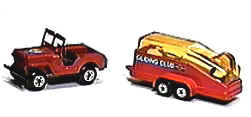
TP-7 Jeep and Glider Trailer
Rare two-pack release TP-7 Jeep and Glider Trailer in Red found in Holland in 1977. The common issue of this two-pack is yellow but the red releases seem to have been only found for a very limited time in Holland. The transparent "glass" on the trailer is amber colored.
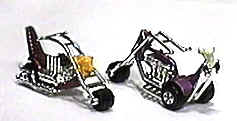
Chop Suey and Stingeroo with Silver Handlebars
In 1973, Matchbox intended to release 6 different "Chopper" motorcycles. Only 3 were released: (1) Stingeroo three-wheeler; and (2) Chop Suey; and (3) Jumbo Jet, two-wheelers. The handlebar/front fork assemblies were all supposed to be chrome plated, but during production the chrome plating chipped off the plastic easily, so the models were formally released with handlebar/fork assemblies in molded colors. The chromed handlebar models are the hardest to find as very few were released to the stores. The common handlebar color for the Stingeroo is purple and the less common is Light Blue. The common color of the handlebar for the Chop Suey is red while the more difficult colors are black or red-orange.
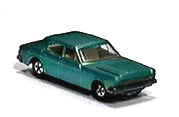
Transitional Ford Zodiac in Metallic Blue
This is another "transitional" Superfast model from 1969/1970. The Ford Zodiac was normally found with black solid plastic regular wheels with a metallic blue body. When converted to Superfast Wheels, the model was commonly found with metallic green or, later on, a light pea green body. This particular model shown is a very rare Superfast model with a metallic blue body that was assembled using left over "regular wheel" colored body. These were released to the stores in this fashion as Lesney had to satisfy shipping requirements and did not want to destroy the models that could be sold.

Field Cars in white
Many unusual models were found in the Two-Pack ranges throughout the 1970's, used by Lesney to clear out odd factory stock. These very rare Field Cars in white, one with and one without chrome imprints were usually found in Germany packed in a TP-8 package. TP-8 consisted of a Field car with Honda Motorcycle and Trailer. The common release of the Field Car in this two-pack was orange.
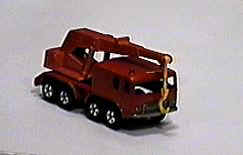
Transitional #30 Mobile Crane
This model is a true "transitional Superfast" model #30 Mobile Crane which originally appeared in the Matchbox 1-75 series range with black plastic "regular" wheels, a green cab/chassis and orange crane boom. In the 1970 catalog most of the 1-75 range was shown converted to Superfast wheels. The standard release Superfast Mobile Crane had a red cab/chassis and a metallic gold painted boom. During the conversion from regular wheels to Superfast from 1969 to 1970 many old stock components were used to make up models in the factory in an effort to keep the assembly lines active. This is one example of a regular wheel issued component (the orange crane boom) used on a Superfast component red cab/chassis assembly.

TP-24 Kodak Articulated Box Truck
In 1979 Lesney was looking to expand the "Two Pack Range" which included two Matchbox models packed together in a theme to include Articulated Trucks similar to the Major Pack models of the 1950's and 1960's in a new series "900 range" (also known as the "Long Haul" range), and these were the predecessors to the current "Convoy" and "Super Rigs" ranges. This proposal was a twofold failure forbidding the models from being included in the range as shown. The obvious first difference is the logo and colors used on the model. Lesney wanted to use the "Kodak" name on the side of the truck and had already started production as shown when it approached Kodak on the use of the trademark, who refused to release the rights to have their name included on the model. Almost all of the trailers with yellow components and "Kodak" labels were destroyed at the factory, but the Yellow cabs were salvaged and packaged as cabs with two other models included in the range: an articulated Pipe Transporter; and a new version of the illustrated casting which included a red trailer with "Matchbox" labels. Blister packed examples of these issues with Yellow cabs are now somewhat rare as the standard issue Pipe Transporter had a metallic green painted cab and the standard issue "Matchbox" box truck had a red cab.
A second failure required Matchbox to change the base plate of the cab to no longer have "Peterbilt" designation, because Peterbilt rejected the license feeling the casting inadequately represented the actual truck (One reasons was that the front radiator assembly was molded in black plastic instead of chrome plated for cost reasons).

